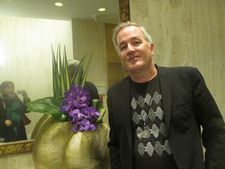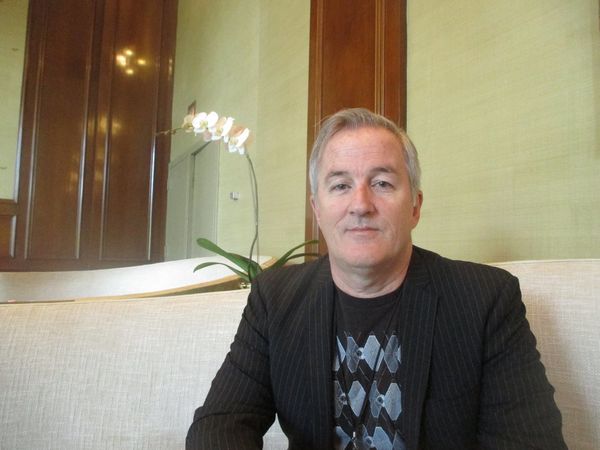 |
| Luke Davies on dinner with Heath Ledger and Philip Seymour Hoffman: "At the Candy première at Berlin. The film Capote was also there." Photo: Anne-Katrin Titze |
Luke Davies, in town for a Writers Guild of America East panel, joined me at the Park Lane Hotel on Central Park South for a follow-up conversation on Beautiful Boy that took us to a dinner he attended in Berlin for Bennett Miller's Capote with Philip Seymour Hoffman and Neil Armfield's Candy star Heath Ledger, and onto Anton Corbijn's A Most Wanted Man and Life.
Felix van Groeningen's Beautiful Boy, co-written with Luke Davies is based on the memoirs by David Sheff (Beautiful Boy: A Father's Journey Through His Son's Addiction) and by his son Nic Sheff (Tweak). The film stars Timothée Chalamet, Steve Carell, Maura Tierney, and Amy Ryan, and is produced by two-time Oscar-winners Dede Gardner and Jeremy Kleiner (Steve McQueen's 12 Years A Slave and Moonlight by Barry Jenkins).
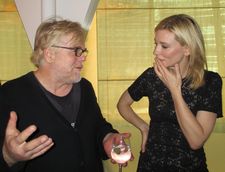 |
| Philip Seymour Hoffman celebrating Cate Blanchett at Le Cirque in 2013 Photo: Anne-Katrin Titze |
Luke Davies, the Oscar-nominated screenwriter for his adaptation of Saroo Brierley's A Long Way Home for Garth Davis's Lion, had doubts about working on Beautiful Boy after having co-written the screenplay for Candy that was based on his book Candy: A Novel Of Love And Addiction, published in 1998.
Anne-Katrin Titze: When we talked after the screening a while back, you said that you didn't know how much you wanted your personal story be a part of the public discussion of Beautiful Boy. What did you decide?
Luke Davies: What I had to do, was talk to my father, and say to him: "This film is getting attention. And I spoke spontaneously about the e-mail that you wrote to me that changed my mind about doing the film.
And I need your permission to talk about it if it comes up again." I thought, it's his story, his e-mail. He was fine, he was like "Yeah, of course. You can do that." He was very generous.
AKT: It's a remarkable story.
LD: It is an amazing story. I really had decided, I'm not going to do this job. It was literally less than 16 hours before going into that meeting with Plan B [Dede Gardner and Jeremy Kleiner] that I got that e-mail from my dad that made me suddenly think, oh maybe this is a message from the heavens that I should.
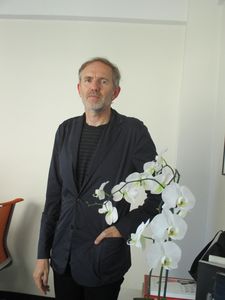 |
| Luke Davies wrote the screenplay for Anton Corbijn's Life, starring Robert Pattinson and Dane DeHaan Photo: Anne-Katrin Titze |
AKT: What did he say in the e-mail?
LD: He said: "Did you hear Philip Seymour Hoffman died? That's really sad. I remember the stories of you guys having dinner in Berlin. Luke, sometimes I feel this family is so blessed." That was the sentence that did it for me.
Beneath that language I knew what he was saying, I knew what that meant. That was his way of saying: "I understand that this is very fragile and tenuous. I understand, like Philip Seymour Hoffman that you can be 22 years clean and sober and relapse and then just die."
It was his way of acknowledging his love for me and gratitude for our family situation that I survived. That I came through the other side and we had some kind of healing process again in our family. He was going out on a limb to write that sentence.
AKT: I can feel that by the way you are describing it. Did you meet Philip Seymour Hoffman through Anton Corbijn [Luke wrote the screenplay for Life]?
LD: No, this was ten years earlier. At the Candy première at Berlin. The film Capote was also there. So one night when neither of us had a screening, the Candy people and the Capote people all had dinner together. In an Italian restaurant in Berlin. It was a lovely dinner with about 12 people. And Heath Ledger and Philip Seymour Hoffman were at the dinner.
So my dad was referring to the fact that years earlier I had told him this story of how we all had dinner. I mean, the Candy première in Berlin, that was my first ever experience of this world of intensity. You know, red carpet and photographers.
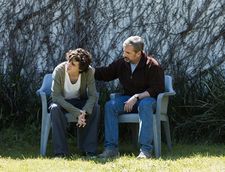 |
| Nic Sheff (Timothée Chalamet) with his father David (Steve Carell) in Beautiful Boy |
And that world of celebrity, like seeing what it's like for someone like Heath Ledger to do that stuff. And yeah, Anton Corbijn made that film [A Most Wanted Man] but I never saw Philip Seymour Hoffman again after that night in Berlin 2006.
AKT: Seeing the orchid behind you - I took a photo of Anton with one just like it in the picture. I only realised it this very moment. I believe in coincidences.
LD: I believe in them. To me the most amazing part of my experience with this film [Beautiful Boy] was how improbable it is that I'm sitting here, that I got the job, that I wrote the script. Because I had literally decided I'm not doing it.
Then I changed my mind at the last minute because of that e-mail from my dad. He didn't know that. It was just because Philip Seymour Hoffman died four days earlier.
AKT: Your life changed a lot, you say, after the tremendous success of Lion. Is there a shift in your poetry from before Lion and now?
LD: No. That has its own separate trajectory. It's the ongoing progression of my poetry. I'm not writing poetry about my new lifestyle being busier.
AKT: No, that's not what I expected. I was merely wondering, because certain things come with that lifestyle. Things might be more on your mind than before and they enter into poetry.
LD: That's an interesting question.
AKT: Maybe some anxieties or obsessions from the past floated away and other things take their place. I don't know.
LD: I don't know if some kind of external success makes the anxieties and obsessions that you have go away. My poetry seems to remain just about, I don't know, some fundamental question, like, tracking your own experience of life as a mythological experience.
The question of how should we live our lives in the face of how short it's all going to be, you know? How should we live right now? So in a weird way that doesn't change.
Read what Luke Davies had to say on the screenplay and the circular structure of Felix van Groeningen's Beautiful Boy.








